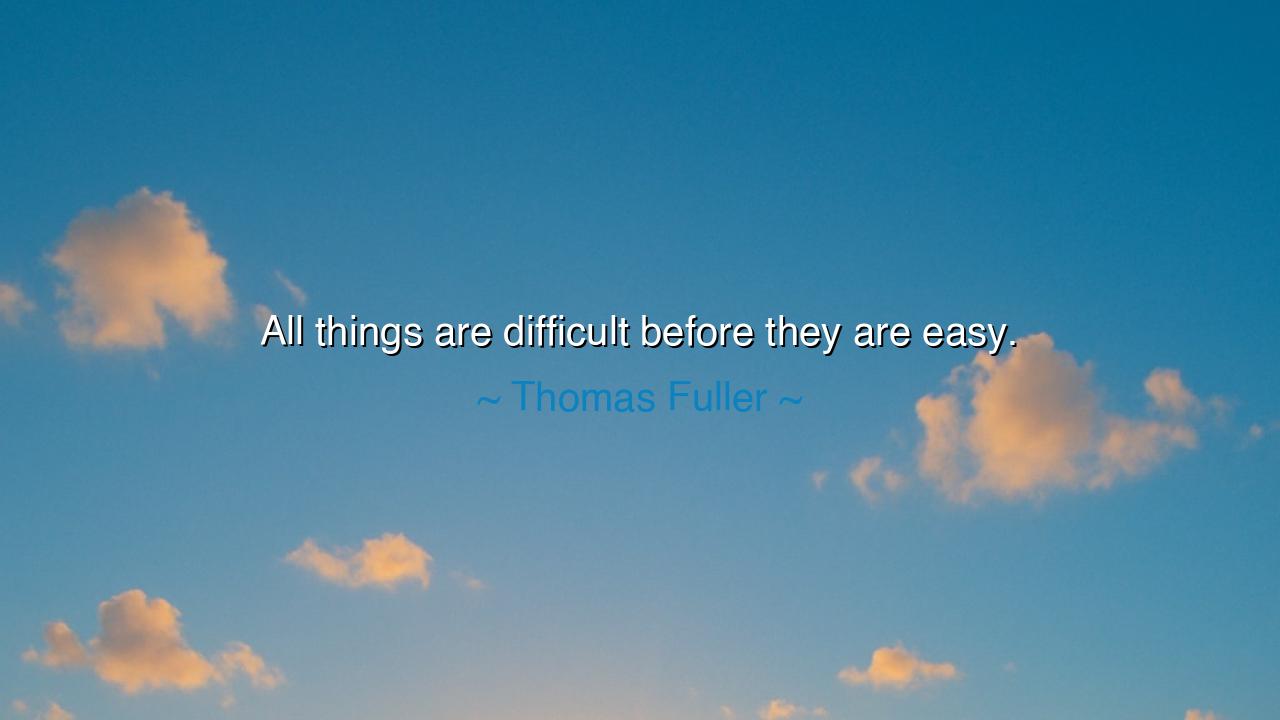
All things are difficult before they are easy.






Hearken, O seekers of perseverance and the unfolding of mastery, to the words of Thomas Fuller, the chronicler of human endeavor: "All things are difficult before they are easy." In this utterance lies the ancient truth that the path to skill, understanding, and achievement is first steeped in struggle, and that effort, patience, and endurance are the keys to transforming the arduous into the attainable.
In the theater of mortal toil, many are disheartened when first confronted with challenge, believing that difficulty signals failure. Fuller illuminates that the labor of initiation is natural, and that mastery is forged in the fires of trial. Every craft, every pursuit, every virtue demands the courage to persist while the task remains demanding and unfamiliar, for ease is the reward of diligence and unwavering application.
The ancients, who chronicled the journeys of heroes, sages, and artisans, understood that struggle precedes proficiency. The young warrior falters before skill, the apprentice stumbles before mastery, the student wrestles with knowledge before enlightenment. In each case, the difficulty is not punishment, but the shaping of the spirit, the strengthening of resolve, and the forging of competence that will endure the tests of life.
Yet this teaching carries subtle depth: to embrace difficulty is to honor the process as much as the outcome. Fuller’s insight urges the seeker to engage fully, with patience and steadfast effort, knowing that the labor itself imparts wisdom, resilience, and character. To resist challenge is to forgo growth; to endure it is to claim the hidden treasure within every task.
Therefore, O children of perseverance and courage, let this teaching lodge in your hearts: all that is worthy begins in difficulty, yet through effort and persistence, the arduous becomes attainable, the unknown familiar, and the impossible possible. In embracing the struggle, one walks the eternal path of growth, honoring the timeless wisdom of the ancients, who knew that every ascent begins with the toil of the first step.






TTBui Ta Tuong
Thomas Fuller’s perspective is a hopeful one, suggesting that struggle is part of the journey. It encourages us to not give up when things are tough. But what happens when a challenge doesn’t seem to get easier, no matter how much time or effort you put into it? Do you think it’s possible to reach a point where something will always remain difficult, or does every challenge have a turning point?
Uuchihaitachi
I really appreciate the simplicity of this quote. It’s a reminder that the learning curve is steep in the beginning, but with effort, we gradually make things easier for ourselves. Do you believe that all challenges eventually become easier with practice, or are there some things that will always feel difficult no matter how much you try?
Tthienhan2009
This quote reminds me that the hardest part of any new endeavor is simply getting started. It suggests that the discomfort or difficulty we face early on is temporary, and with time, we get better at it. But how do you deal with the feeling of frustration when something continues to feel difficult, even after a long time? Is there a point where persistence alone isn’t enough?
HQHa Quan
Thomas Fuller’s quote really resonates with the idea that growth and success require effort and persistence. It’s easy to get discouraged when things feel difficult at first, but the truth is, almost everything worth achieving starts out as a challenge. Have you experienced something in your life that felt impossible at the beginning but became easier with time? How did you push through those initial struggles?